- Jacqueline Genovesi
- Vice President
- Presenter’s NSFRESOURCECENTERS
- The Academy of Natural Sciences of Drexel University, Drexel University, Philadelphia Education Fund
- Kimberly Godfrey
- Manager of Social Justice Programs
- Presenter’s NSFRESOURCECENTERS
- The Academy of Natural Sciences of Drexel University
- Nancy Peter
- https://www.linkedin.com/in/nancy-peter-8368833/
- Director
- Presenter’s NSFRESOURCECENTERS
- Philadelphia Education Fund
Engaging Women in Engineering: Training Mentors to Make a Difference
NSF Awards: 1849735
2021 (see original presentation & discussion)
Grades 9-12
The Academy of Natural Sciences of Drexel University is modifying its nationally recognized Women in Natural Sciences (WINS) program to meet the needs of female students and professionals in engineering. In collaboration with Drexel's College of Engineering, School of Education and the Philadelphia Education Fund, the Engineering WINS (EngWINS) program is developing the capabilities of working engineers and faculty to serve as mentors in a new initiative to develop interest, self-efficacy, and persistence in engineering careers among urban high school women in grades 9-12 (100% low income; 85% under-represented minorities).
Many studies demonstrate that when mentors and mentees are from similar backgrounds, gains among students are maximized. But when homogeneous populations dominate STEM fields, there is little opportunity to match mentor-mentee pairs by ethnicity or gender. This project is investigating how and to what extent a largely homogeneous group of working engineers can enter into mentoring relationships that increase participation in their field by under-represented populations. We will enroll adult mentor candidates into a full year of training in culturally relevant pedagogies and ways to combat stereotype barriers and implicit biases prior to entering into mentoring relationships and engage them in the design of a new curriculum that sparks and sustains the interests of adolescent women of color in the multidisciplinary field of engineering.
We are studying:
1. To what extent does training in culturally responsive pedagogies and anti-discriminatory frameworks shift adult mentors' mindsets and dispositions towards their work with EngWINS students and in other teaching contexts or workplace interactions with women and minorities?
2. To what extent do pairings of mentors and mentees from different backgrounds influence students' interest, self-efficacy, and persistence in engineering education and careers?
3. To what extent does interest, self-efficacy, and persistence in engineering differ between EngWINS students who have a mentor vs. those who only experience the EngWINS curriculum?
Related Content for Engineering WINS
-
 2016Engineering Inclusive Teaching: Faculty Development
2016Engineering Inclusive Teaching: Faculty Development
Diane Matt
-
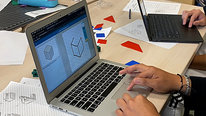 2022Software to Increase Success, Diversity, & Retention in STEM
2022Software to Increase Success, Diversity, & Retention in STEM
Lelli Van Den Einde
-
 2016#ilooklikeanengineer
2016#ilooklikeanengineer
Ron Ulseth
-
 2022Engineering Success for Transfer Students
2022Engineering Success for Transfer Students
Claire Duggan
-
 2019Improving STEM Success through Spatial Skills Training
2019Improving STEM Success through Spatial Skills Training
Sheryl Sorby
-
 2016An Exploration of Best Mentoring Practices of STEM Program
2016An Exploration of Best Mentoring Practices of STEM Program
Germysha Little
-
 2017SciGirls Profiles: Real Women, Real Jobs
2017SciGirls Profiles: Real Women, Real Jobs
Rita Karl
-
 2022Engaging Girls in Ubiquitous Intelligence and Computing
2022Engaging Girls in Ubiquitous Intelligence and Computing
Mei Yang
Playlist: ITEST Videos Playlist
-
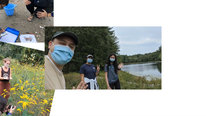 2021Socially-Distanced Community Conservation Partnerships
2021Socially-Distanced Community Conservation Partnerships
Nicole Freidenfelds
-
 2021CryptoComics - Cryptology and Cybersecurity for Kids
2021CryptoComics - Cryptology and Cybersecurity for Kids
Christine Wusylko
-
 2021Stories of Algebra for the Workplace
2021Stories of Algebra for the Workplace
Candace Walkington
-
 2021Empowering Students in Math Through Entrepreneurship
2021Empowering Students in Math Through Entrepreneurship
Erin Krupa
-
 2021Inventing Designing and Engineering for All Students
2021Inventing Designing and Engineering for All Students
Wendy Martin
-
 2021The Human Body in P6 STEM Teaching: The BODYMODELS Project
2021The Human Body in P6 STEM Teaching: The BODYMODELS Project
Neal Grandgenett
-
 2021Our Experiences with Game Based CRC, Esports, and the Future
2021Our Experiences with Game Based CRC, Esports, and the Future
Mark Van Auken
-
 2021iSTEM-Xe: Implications of COVID-19 on the Black Community
2021iSTEM-Xe: Implications of COVID-19 on the Black Community
Shannon Jolly
-
 2021Interest Stereotypes Cause Gender Gaps in STEM Motivation
2021Interest Stereotypes Cause Gender Gaps in STEM Motivation
Marley Jarvis
-
 2021Voices to Hear
2021Voices to Hear
Shakuntala Gopal
-
 2021Challenger Center Classroom Adventures
2021Challenger Center Classroom Adventures
Lance Bush
-
 2021Chief Science Officers Go Virtual
2021Chief Science Officers Go Virtual
Kelly Greene
-
 2021Billion Oyster Project Curriculum and Community Enterprise
2021Billion Oyster Project Curriculum and Community Enterprise
Dr. Lauren Birney
-
 2021Catalyzing Inclusive STEM Experiences: Tune in for Equity
2021Catalyzing Inclusive STEM Experiences: Tune in for Equity
Lara Hebert
-
 2021Super Fun Science of Music Hands-on Online Tools.
2021Super Fun Science of Music Hands-on Online Tools.
Victor Minces
-
 2021Impact of a Family-Community-University Engineering Project
2021Impact of a Family-Community-University Engineering Project
Amber Simpson
-
 2021SPIKEY-20: A Virtual Epidemic for Connecting with COVID-19
2021SPIKEY-20: A Virtual Epidemic for Connecting with COVID-19
Yasmin Kafai
-
 2021GaleForce: Girls Immersed in Robotics Learning Simulations
2021GaleForce: Girls Immersed in Robotics Learning Simulations
Beryl Hoffman
-
 2021My STEM Story: Students Explore Science Identities
2021My STEM Story: Students Explore Science Identities
Ed Madison
-
 2021COVID-Inspired Data Science for Youth
2021COVID-Inspired Data Science for Youth
Jan Mokros
-
 2021Engineering Design for Rural Middle School Students
2021Engineering Design for Rural Middle School Students
LaTricia Townsend
-
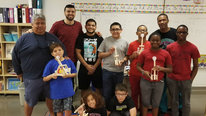 2021SEBA: STEM Engagement Through Mentoring
2021SEBA: STEM Engagement Through Mentoring
Rick Greer
-
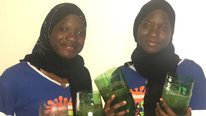 2021Engineering WINS
2021Engineering WINS
Jacqueline Genovesi
-
 2021Developing Middle School Students' AI Literacy
2021Developing Middle School Students' AI Literacy
Helen Zhang
-
 2021Collaboration Dynamics and Culturally Responsive Teaching
2021Collaboration Dynamics and Culturally Responsive Teaching
Meredith Kier
-
 2021Sustaining a STEM Learning Ecosystem During a Pandemic
2021Sustaining a STEM Learning Ecosystem During a Pandemic
Denise Nacu
-
 2021Internships for Underrepresented Students Amid the Pandemic
2021Internships for Underrepresented Students Amid the Pandemic
Lynda Gayden
-
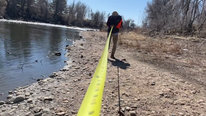 2021Place-Based Data Literacy: Protecting the Platte
2021Place-Based Data Literacy: Protecting the Platte
Samantha Schall
-
 2021Embodied Coding in Augmented and Virtual Reality
2021Embodied Coding in Augmented and Virtual Reality
Ying Wu
-
 2021WeatherBlur: student initiated citizen science program
2021WeatherBlur: student initiated citizen science program
Rebecca Clark Uchenna
-
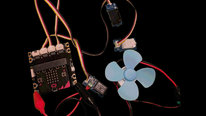 2021Enabling Opportunity: Bridging Science & Physical Computing
2021Enabling Opportunity: Bridging Science & Physical Computing
David Jackson
-
 2021Helping States Plan to Teach AI in K-12
2021Helping States Plan to Teach AI in K-12
Christina Gardner-McCune
-
 2021RPPforCS: Research Practitioner Partnerships across K-12
2021RPPforCS: Research Practitioner Partnerships across K-12
Rebecca Zarch
-
 2021Keeping the focus on dimensions of quality math discourse
2021Keeping the focus on dimensions of quality math discourse
Paola Sztajn
-
 2021Building Community to Shape Emerging Technologies
2021Building Community to Shape Emerging Technologies
Judi Fusco



Jacqueline Genovesi
Vice President
Welcome to Engineering WINS (Engaging Women in Engineering: Training Mentors to Make a Difference). EngWINS is an exciting partnership between a natural history museum (The Academy of Natural Sciences) a University (Drexel University College of Engineering and School of Education) and a city educational not-for-profit (the Philadelphia Education Fund). The project seeks to transform a 40 year old STEM program into a power-house pathway to engineering and STEM for minoritized young women in Philadelphia. Please enjoy our video and we welcome questions and comments about our partnership, project and research.
Nancy Peter
Director
Great project, great video!!
Jacqueline Genovesi
Michael Briscoe
I agree with Nancy, tying mentorship with hands-on projects that require persistence and design thinking is a real winning combination. I particularly loved that alumna of the program are now serving in leadership roles. One project you may want to add to your repertoire is a community garden since it will strengthen the cross-generation connections even more. I look forward to seeing your program and students grow!
Jacqueline Genovesi
Vice President
Michael,
Thank you for your comment. I love the gardening idea. We already have a gardening program with our pK and community partners. Having our WINS participants join with them would be an easy lift. BTW love your Fleet project!
Kimberly Godfrey
Manager of Social Justice Programs
I agree. We have connected with local community gardens in the city through our Science in the City Unit, allowing students to learn about growing food in some of the city's "food deserts". One of our current seniors did some work with one of these Community Gardens for a senior project not far from the Museum.
Nancy Peter
Director
Agree with both of you. This is not unique to EngWINS - but I am particularly pleased that we were able to continue with the program during the Pandemic - with several modifications, of course.
Kimberly Godfrey
Manager of Social Justice Programs
Hello fellow STEM champions! Thank you for visiting and for voting for our Engineering WINS program. Since our inception, the WINS Team worked hard to provide young women the tools they need to pursue STEM, and we've created a community of like-minded young women that support and empower each other as well. We are so grateful for the love and support for our program, but I also want to send a special shout out to all of our WINS participants for choosing this program and its mentors to be a part of their future success!
Megan Davis
Love the EngWINS work! As you pivot from Natural Sciences to Engineering, I encourage you to check out the work of my former employer Techbridge Girls (exec dir Nikole Collins-Puri, former dir and founder Linda Kekelis). We had a NSF grant for Role Model training in our engineering-focused girl-serving intervention; see the resources developed at https://www.techbridgegirls.org/rolemodelsmatter/
Nancy Peter
Director
Thanks so much, Megan - will do. In fact, Nikole and Techbridge Girls have been working with the Philadelphia Education Fund and GSK on the Philadelphia STEM Equity Collective.
Jacqueline Genovesi
Vice President
It is so funny you mention this. We actually just had an introductory meeting last month to talk about our programs and possible partnerships.
Nonye Alozie
Hi Jacqueline and team-
Lovely video and very inspiring project. Before going into full time research, I also lead out of school time programs for young students of color, girls and students from under-resourced communities. I am curious about how you recruited the participants into this program. Did they apply? Were they nominated by teachers? What sort of criteria did you use? Also, do you follow the students after they complete the program? What does their trajectory look like?
Thank you!
Mike Vargas
Physics Teacher
Great Question Nonye - I too would like to learn more about this :>
Nancy Peter
Director
These are great questions. EngWINS is relatively new - so the program staff can answer questions about recruitment, but not about retention or tracking. However, WINS has been around since 1882, and Jacquie and Kim (the Program Coordinator) can answer those questions specifically.
Kimberly Godfrey
Manager of Social Justice Programs
Thank you for checking us out Nonye! To recruit our students there are various steps and select criteria we use. For the recruitment process, we first ask teachers, counselors, colleagues, and current WINS participants and Alumnae to nominate students. Only those who are nominated receive an application. From our completed applications, we interview 50 students for 25 spots. We specifically recruit for students who attend Philadelphia public and charter high schools, placing special emphasis (but not required) on those coming from households facing financial limitations.
We also like to note that our students are expected to maintain a B average throughout high school, but do not have to be the academic star to be selected for the program. They also do not have to like science, but at least be open to exploring new things out of their comfort zone.
We try our best to reach out to alumnae through various surveys to check in. We've had a few program evaluations over the years that included connecting with alumnae to learn about the broader impact of WINS after they moved on to college and their careers, and we are currently running a pilot project to learn more about the broader impacts of the program.
As of now, we know that approximately 65% of our graduates pursue a STEM major in college, and approximately 44% of our alumnae graduate and go on to STEM careers.
Does this help? Again thanks so much for checking us out! :)
Nonye Alozie
Nonye Alozie
Thanks Kimberly. That is helpful to know!
Mike Vargas
Physics Teacher
Kimberly - I love this program. Your numbers for who graduates to go on and pursue STEM careers is impressive. I was wondering about the mentor side of the program. You mentioned above:
We will enroll adult mentor candidates into a full year of training in culturally relevant pedagogies and ways to combat stereotype barriers and implicit biases prior to entering into mentoring
Can you elaborate some more on this?
Nancy Peter
Director
Hi Mike,
Great questions (these are all great questions!). As I mentioned in an earlier exchange, the EngWINS mentoring program is just getting off the ground. My role is to primarily provide professional development; and within that, to train mentors on interfacing successfully with urban adolescents. My training sessions begin next week and will include general teaching tips, suggestions specific to working with teens, and opportunities to problem-solve difficult situations. My training partner is Hillary Blecker, from Hillary Blecker Consulting. Hillary will focus on cultural competence and combating implicit bias. Hope that helps.
Nancy
Jacqueline Genovesi
Vice President
Mike- great question. Our original grant was to have mentors attend a series of professional development workshops around culturally responsive pedagogues, diversity dialogue trainings, and general trainings around working with teens. This was to happen over a 4-6 month period. Because of COVID, we are just now starting trainings and these will be virtual and over a only a couple of months. We will give mentors a foundation to start working with our students and then support them throughout their mentoring with regular check ins. Hope that answers your question.
Thomas Smith
Professor
I love how "hands on" this program is. Great historical numbers for program graduates pursing a STEM major in college! Your research questions ask "to what extent do pairings of mentors and mentees from different backgrounds influence students' interest, self-efficacy, and persistence in engineering education and careers?" How are you measuring interest, self-efficacy, and persistence? Will there be a comparison group?
Nancy Peter
Director
Thanks Thomas. I will let Jacquie respond, and describe the evaluation component of the project.
Jacqueline Genovesi
Vice President
Thomas thank you for the question. We will be measuring interest, self-efficacy and persistence using the Student Attitudes Toward STEM survey and the STEM Career Inventory survey along with narrative and discourse analysis of interviews, focus groups and journals. The comparison group we are using are students in the EngWINS program that do not participate in the internships.
Thomas Smith
Professor
Thanks for the response! How/who decides whether a student participates in the internship? Why does this make a good comparison group?
Rebecca Vieyra
Doctoral Student
Hi, all! It's great to see this opportunity for Philadelphia-area students.
I am curious about the overall participant experience. How long does it last? Is it a primarily after-school or summer program?
It also appears that students tackle a bunch of different challenges (both smaller scale classroom-type activities, as well as place-based work). I am curious to know what guides the selection of these challenges (student interest, "Grand Challenges," etc!)
Jacqueline Genovesi
Vice President
Good Morning,
So the WINS program is a 4-year program that starts the summer before students enter 9th grade. It is more intensive in the summer but it is a year-round program that is a combination of STEM, positive youth development and college/career exploration. Our curriculum follows a combination of things including Academy collection and science, Philadelphia/NGSS topics, and student interests. The EngWINS program which is specifically this project takes place during the first year of the program for curriculum units and during the second year of the program for internships with professional engineers. Kim can definitely talk more details about specific engineering activities.
Kimberly Godfrey
Manager of Social Justice Programs
Thank you Jacquie!
To add on, we look for a variety of opportunities to explore both in and outside the city. The first Unit is our Science in the City Unit, where we explore various ways that science connects to everyday routine, like waste, water, energy, etc. These experiences are not only a reminder of the amount of work (science) that goes into things we take for granted, but the fact they provide career options.
Another important component of the program is that every student in their first year of WINS has [almost] the same experiences. While we have modified to keep up with new information, and the fact that we are incorporating engineering as it connects to natural sciences, the themes for the first year remain the same. Every WINS participate can relate and talk about the first time they help a cockroach, did a squid dissection, and been to PEEC to hike to Tumbling Waters waterfall.
As mentioned, we have been applying engineering to our activities as they relate to our "units." Our Science in the City unit is a great time to incorporate engineering. In our water unit we build our own homemade water purifiers and work in groups to plan how to distribute clean water in a crisis. When talk a lot about biomimicry when learning about adaptations and the importance of turning to nature to solve simple and complex problems. We also learn about how engineering relates to conservation, sustainability, and environmental justice.
Nancy Peter
Director
Great questions - I will defer to Kim (the project manager)
Lindsay Adams
Wow! 54% of your participants have careers in STEM, that's great! Did these girls already have a predisposition towards positive attitudes in STEM? Or did you see a shift in attitudes after the completion of the project?
Jacqueline Genovesi
Kimberly Godfrey
Manager of Social Justice Programs
Many applicants come in stating they want to pursue a STEM career, but there tends to be a trend toward medical sciences. There are some who come in and graduate following their original plan, but some will shift their majors to environmental, biological, and chemical sciences in hopes of doing research. We've had students purse environmental education, and even those who were interested in fields like law and politics graduate from the program pursuing environmental policy. Many students have accredited the program for helping to determine their career path.
We also like to note that while the goal, of course, is to increase interest in STEM, we celebrate and support all decisions that lead to success. No matter what, all of our participants move on having a stronger appreciation for the science and educated in environmental stewardship. :)
Thomas Smith
Professor
So great to have students discover interests in STEM beyond the medical science!
Rebecca Vieyra
Doctoral Student
Thanks to all for the detailed answers!
Ayana Allen-Handy
So proud to be a part of this amazing team!
Shannon Schmoll
I really like hearing from the participants and how it impacted them. I also love that it makes connections that impact their lives. This is a great project and video!
Jacqueline Genovesi
Vice President
Thank you for the kind words. The program staff work to make the curriculum relevant to our students' lives. I think it really helps that we have alumnae both working in the program and serving as mentors.
Nancy Peter
Director
@Shannon - thank you! I ran the WINS program from 1984 to 1994, and am beyond thrilled to be working with the program again.
Monica Cardella
Thank you for your work on this project, and thank you for creating and sharing this video. Thank you for sharing how you are developing curricular materials and training mentors in culturally-responsive pedagogies and anti-discriminatory frameworks. I enjoyed hearing from current engWINS participants and alumni!
Further posting is closed as the event has ended.